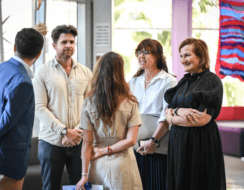22 Jul 2016
NewsCultural maintenance crucial for children in out-of-home care
Participants at the “Every Child Has a Culture” forum in Bankstown recently.
The forum was organised to assist foster care agencies and their caseworkers to better understand and respond to the cultural needs of children and young people from culturally and linguistically diverse backgrounds (CALD) in out-of-home care in NSW, with a particular focus on permanency planning.
SSI Executive Manager, Families and Inclusion, Stephen O’Neill, said that the maintenance of a child’s cultural background while in out-of-home care was critical to their sense of belonging and their development.
SSI Multicultural Foster Care — an accredited foster care agency specialising in placing children of a CALD background with foster carers of the same background where possible — has an innovative cultural care model, intrinsic to how the service works with foster carers, birth families and children in care.
“SSI is leading the conversation about ways to improve and expand caseworker thinking and responsiveness, and to improve the ways we connect with and understand the needs of children in care,” Mr O’Neill said.
The forum was organised by SSI, NSW Family and Community Services (FACS), the Association of Children’s Welfare Agencies, Connecting Carers and Stretch-a-Family.
Penny Hood, Director of Innovation, Co-Design and Implementation, with FACS, led an interactive presentation on the new Care and Cultural Care template; a collaborative project between the department, NGOs and the Children’s Court, which was designed to ensure that culture is at the forefront for children in care.
“Mandating cultural planning in the Care Plan for Aboriginal and Torres Strait Islander children and children from multicultural backgrounds is one way that the sector can enhance support of a child’s cultural identity and further their sense of belonging to family and community,” Ms Hood said.
The challenges and complexities of casework with children from CALD backgrounds and their foster carers was highlighted, but there were many case studies and experiences shared, including the importance of Life Story Work (LSW), working with bilingual and bicultural support staff and collaborating with CALD community organisations and leaders, to assist in developing strategies to overcome those challenges.
An emotional tribute was made to SSI bilingual caseworker Samia Hawat, who passed away in December 2015. Ms Hawat’s Life Story Work was exceptional and she employed strategies including the use of cooking, apps and artwork to achieve significant connections and progress with children in care and with their birth parents. The tribute included moving testimonials from children and carers that she had supported.
More than 70 participants from a range of services within the out-of-home care sector attended the forum to hear from the Children’s’ Court Registrar and Clinic Assessor, and staff from SSI and other foster care agencies.


